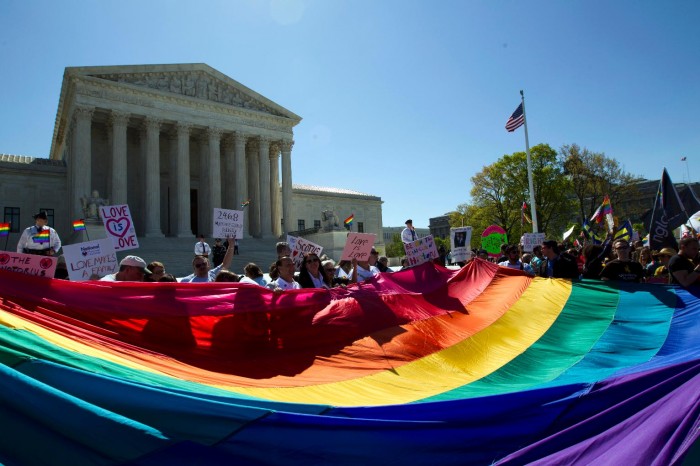
The Supreme Court has found a constitutional right to same-sex marriage, striking down bans in 14 states and handing a historic victory to the gay rights movement that would have been unthinkable just 10 years ago.
Anthony Kennedy, a conservative justice who has broken with his ideological colleagues to author several decisions expanding rights for LGBT people, again sided with the court’s four liberals to strike down the state bans. The 5-4 majority ruled that preventing same-sex people from marrying violated their constitutional right to due process under the 14th Amendment and that the states were unable to put forth a compelling reason to withhold that right from people.
“It would misunderstand these men and women to say they disrespect the idea of marriage,” Kennedy wrote of same-sex couples. “Their plea is that they do respect it, respect it so deeply that they seek to find its fulfillment for themselves.”
“They ask for equal dignity in the eyes of the law,” he continued. “The Constitution grants them that right.”
The United States is now just the 21st country in the world to allow same-sex marriage in every jurisdiction.
Chief Justice John Roberts read a stinging dissent from the bench, as Kennedy sat beside him, his hand on his chin. “Five lawyers have closed the debate and enacted their own vision of marriage as a matter of constitutional law,” he wrote. “Stealing this issue from the people will for many cast a cloud over same-sex marriage, making a dramatic social change that much more difficult to accept.”
Roberts told same-sex couples they could “celebrate today’s decision,” even though he disagreed with it so strongly.
“Celebrate the achievement of a desired goal. Celebrate the opportunity for a new expression of commitment to a partner. Celebrate the availability of new benefits,” he wrote. “But do not celebrate the Constitution. It had nothing to do with it.”
Despite Roberts’ harsh words, people in the courtroom were all smiles as they poured out onto the steps after the decision. Some wiped tears from their eyes.
In oral arguments last April, Kennedy expressed reservations about changing the traditional definition of marriage to include LGBT people and seemed to suggest that the court should allow the American public to continue debating the relatively new concept.
“The word that keeps coming back to me in this case is millennia,” he said then, referencing the amount of time societies had considered marriage to be only between a man and a woman.
But Kennedy was swayed by the fact that hundreds of thousands of married same-sex couples already exist and that they — and their children — are being treated differently by the law when they move to a state that doesn’t recognize their union. The states in the case also had trouble articulating why they had a compelling reason to deny that recognition, saying only that it was in the interest of children to only allow couples of the opposite sex to marry.
The decision came just two years after the Supreme Court ruled that the federal government could no longer refuse to recognize married same-sex couples who lived in the handful of states that had legalized their unions. That decision, also written by Kennedy, caused a cascade of lower court decisions striking down state same-sex marriage bans, and now 36 states allow same-sex marriage. Public opinion on gay marriage has changed at lightning speed as well: 60 percent of Americans support it, compared with just 37 percent 10 years ago.
This transformative opinion will most likely continue the trend toward greater acceptance of LGBT people around the country, as the highest court of the land has ruled that same-sex unions are legitimate and lawful everywhere.
Even with the landmark decision, however, support for gay marriage has been almost nonexistent among elected Republican officials, whose positions on the issue likely will not change overnight. To date, no major Republican presidential candidate has endorsed marriage equality. Many 2016 GOP candidates even struggled with the question of whether or not they would attend a gay wedding.
Despite public opposition, many Republican operatives privately have suggested that court rulings favorable to gay marriage are a blessing in disguise for GOP politicians. With the judicial system expanding gay rights, the courts have eased the burden on the legislative and executive branches, removing pressure for them to act proactively on marriage equality policy.
